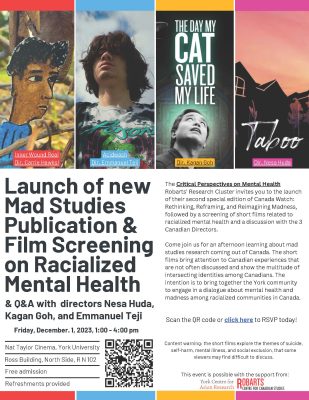Launch of new Mad Studies publication | Film Screening and Q & A on Racialized Mental Health with directors Nesa Huda, Kagan Goh and Emmanuel Teji


Friday, 01 December 2023 | 13:00 to 16:00 EST | Nat Taylor Cinema, room 102, North Ross Building, York University’s Keele Campus | In person
The Critical Perspectives on Mental Health Robarts' Research Cluster invites you to the launch of their second special edition of Canada Watch: Rethinking, Reframing, and Reimagining Madness, followed by a screening of short films related to racialized mental health and a discussion with the three Canadian directors.
Come join us for an afternoon learning about mad studies research coming out of Canada. The short films bring attention to Canadian experiences that are not often discussed and show the multitude of intersecting identities among Canadians. The intention is to bring together the York community to engage in a dialogue about mental health and madness among racialized communities in Canada.
Free admission. Refreshments provided.
More information about the films:
Acidwash, by director Emmanuel Teji
Taboo, by director Nesa Huda
The Day My Cat Saved My Life, by director Kagan Goh
Inner Wound Reel, by director Carrie Hawks
Content warning: the short films explore the themes of suicide, self-harm, mental illness and social exclusion, that some viewers may find difficult to discuss.
This event is possible with the support from the York Centre for Asian Research and the Robarts Centre for Canadian Studies.
About the Films
Acidwash (2022) is a dark comedy about Dani, a bedroom producer/struggling artist who battles with their mental health during the pandemic. With no job, no prospects, and no one to turn to, he considers whether life is worth living. Through an unexpected invitation into the local skateboard community of Toronto, he finds long-needed connection and opportunity. This film looks at the intersection of the often-overlooked complexities of depression and the vibrant spirit and camaraderie of the skateboarding community. Director Emmanuel Teji is a Toronto-based filmmaker and musician. This film was inspired by Emmanauel’s own experiences finding support in the skateboard community while dealing with isolation during the pandemic.
Inner Wound Real (2022) is an animated short documentary that relays the story of three BIPOC folks who self-injure, then find new ways to cope. Each participant’s story has its own distinct visual style. The chapters are independent puzzle pieces that together form the 15-minute film. Everyone self-harms in some way, such as smoking, excessive drinking, or eating unhealthy foods, yet self-injury carries a unique stigma. While most media depictions of self-injury focus on able-bodied white cis-women, this project focuses on three individuals: an Indian cismale, a Black transgender non-binary person, and a Filipinx queer femme who all find solace in the arts. The variety of family backgrounds and identities show how this practice spans across racial, ethnic, and gendered groups. Director Carrie Hawks (they/them) is an American filmmaker whose work confronts self-imposed and external assumptions about identity to promote healing, particularly in relation to Blackness, gender, and queer sexuality.
Taboo (2023) is a short film about BIPOC diaspora, being Muslim and suicide. The film is about Naureen, a Muslim girl whose best friend Yousef tries to die by suicide, a Cardinal sin in Islam, and the fallout that ensues with the community and with their own friendship. Yousef, already in a precariously vulnerable position, watches his community shut him out when all he wants is support and understanding. This film speaks to the struggle that many racialized people face when talking about mental health and was inspired by events in Director Nesa Huda’s life growing up in Mississauga, as a daughter of South Asian immigrants. While mental health conversations are slowly being destigmatized and marginalized communities are not often included. They still must navigate their religious, traditional, and Canadian identities before they can even begin to talk about the issues of the mind.
The Day My Cat Saved My Life (2021) is based on a true-life story of a severe psychotic episode which brings the narrator to the brink of suicide, where he is eventually found and saved by his cat. Director Kagan Goh is a Vancouver based multidisciplinary mad artist, playwright and mental health advocate. Kagan approaches their work from their lived and is committed to putting his creative talents - writing, spoken word, acting, filmmaking and storytelling, to good use by educating people about mental health issues and fighting the stigma against people with mental health challenges. His personal mission is to educate people about mental health issues and fight the stigma against the mentally ill.
2023-11-17 11:12:42

